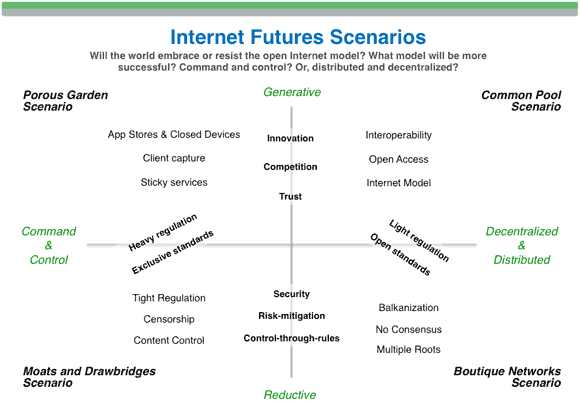Last update : July 25, 2013
There are different Internet Organizations that play a key role in the evolution of the Internet by developing recommendations, standards, and technology, deploying infrastructure and services, and addressing other major issues.
- World Wide Web Consortium (W3C) is the main international standards organization for the World Wide Web. Founded by Tim Berners-Lee at MIT in 1994 and currently headed by him, the consortium is made up of member organizations which maintain full-time staff for the purpose of working together in the development of standards for the world wide web.
- The Internet Society (ISOC) is an international, non-profit organization founded in 1992 by Vint Cerf, Bob Kahn and Lyman Chapin to provide leadership in Internet related standards, education, and policy.
- The Internet Architecture Board (IAB) is the committee charged with oversight of the technical and engineering development of the Internet by the ISOC. The body was originally created originally with the name Internet Configuration Control Board during 1979, it became the Internet Advisory Board during 1984 and then the Internet Activities Board during 1986. It finally became the Internet Architecture Board, under ISOC, during 1992.
- The Internet Assigned Numbers Authority (IANA) is the entity that oversees global IP address allocation, autonomous system number allocation, root zone management in the Domain Name System (DNS), media types, and other Internet Protocol-related symbols and numbers. Starting in 1988, IANA was funded by the U.S. government; ten years later the IANA function was transferred to ICANN.
- The Internet Corporation for Assigned Names and Numbers (ICANN), is a nonprofit private organization created in 1998, that is responsible for the coordination of the global Internet’s systems of unique identifiers and, in particular, ensuring its stable and secure operation. This work includes coordination of the Internet Protocol address spaces (IPv4 and IPv6) and assignment of address blocks to regional Internet registries.
- The Internet Engineering Task Force (IETF) develops and promotes Internet standards, cooperating closely with the W3C, ISO and IEC standards bodies and dealing in particular with standards of the Internet protocol suite. It is an open standards organization, with no formal membership or membership requirements. The first IETF meeting was in 1986.
- The Internet Engineering Steering Group (IESG) is a body composed of IETF chair and area directors. It provides the final technical review of Internet standards and is responsible for day-to-day management of the IETF.
- The Internet Research Task Force (IRTF) promotes research of importance to the evolution of the Internet by creating focused, long-term research groups working on topics related to Internet protocols, applications, architecture and technology.
- The International Electrotechnical Commission (IEC) is a non-profit, non-governmental international standards organization that prepares and publishes International standards for all electrical, electronic and related technologies – collectively known as electrotechnology. The IEC held its inaugural meeting in 1906.
- The International Organization for Standardization (ISO) is an international standard-setting body composed of representatives from various national standards organizations. Founded in 1947, the organization promulgates worldwide proprietary, industrial, and commercial standards.
- The Web Science Trust (WST) is a joint effort originally started between MIT and University of Southampton to bridge and formalize the social and technical aspects of the World Wide Web.
- The World Wide Web Foundation (Web Foundation) is an organization dedicated to the improvement and availability of the World Wide Web. The formation of the organization was announced on September 14, 2008 by Tim Berners-Lee at the Newseum (interactive museum of news and journalism) in Washington.
- The Web Performance Optimization Foundation (WPO Foundation) (is a non-profit for web performance, with the goal to help fund open source web performance projects and public research into web performance.

